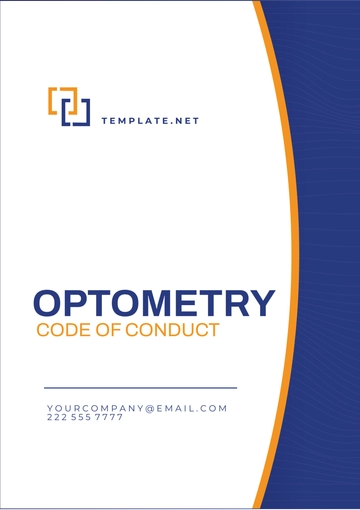Free Optometry Code of Conduct

_____________________________________________________________________________________
I. Introduction
The [Your Company Name] is dedicated to fostering excellence in the practice of optometry. This Code of Conduct establishes the fundamental principles and standards that guide the professional conduct of optometrists in [Country]. It serves as a compass, ensuring that optometrists provide the highest quality of eye care while upholding the values of integrity, compassion, and ethical responsibility. By adhering to this Code, optometrists demonstrate their commitment to promoting the well-being and trust of patients, colleagues, and the broader community.
II. Ethical Principles
A. Patient Care
Optometrists pledge to prioritize the health and welfare of their patients above all else. They commit to delivering compassionate, evidence-based, and culturally sensitive care that respects the autonomy and dignity of every individual. Optometrists shall engage patients in shared decision-making, ensuring they are fully informed about their treatment options, risks, and benefits. Moreover, optometrists uphold confidentiality and maintain accurate and comprehensive patient records, safeguarding the privacy and trust of those under their care.
B. Professional Integrity
Integrity forms the cornerstone of optometric practice. Optometrists vow to uphold the highest standards of honesty, transparency, and professionalism in all interactions. They shall refrain from deceptive or fraudulent behavior and always act in their patients' best interests. Furthermore, optometrists commit to ongoing professional development and peer collaboration, continuously enhancing their knowledge and skills to provide optimal eye care services.
III. Professional Conduct
A. Conflict of Interest
Optometrists must navigate potential conflicts of interest with utmost transparency and integrity. They shall disclose any financial or personal relationships that may influence their professional judgment and take appropriate steps to mitigate such conflicts. Optometrists shall prioritize the interests of their patients above all other considerations and refrain from accepting gifts, incentives, or favors that may compromise their objectivity or impartiality.
B. Professional Boundaries
Maintaining clear and respectful professional boundaries is essential for fostering trust and confidence in the patient-practitioner relationship. Optometrists shall refrain from engaging in behavior that may exploit or harm patients, colleagues, or staff. They shall uphold professional dignity and respect for all individuals, irrespective of age, gender, ethnicity, or socioeconomic status. Optometrists must recognize and address any instances of harassment, discrimination, or unprofessional conduct within the workplace or professional settings.
IV. Community Engagement and Advocacy
Optometrists play a vital role in promoting eye health and advocating for policies that enhance access to quality eye care services. They should actively engage with their local communities, collaborating with other healthcare professionals, community organizations, and policymakers to raise awareness about eye health issues and advocate for initiatives that improve access to eye care for underserved populations. Optometrists should participate in community outreach events, support vision screening programs, and contribute their expertise to public health initiatives aimed at preventing and managing vision problems.
V. Professional Development and Cultural Competence
A. Professional Development
Optometrists recognize the importance of lifelong learning and professional growth. They commit to engaging in ongoing education and training to stay abreast of advancements in optometry and related fields. This includes pursuing continuing education opportunities, participating in relevant workshops and seminars, and seeking out mentorship and peer collaboration. By continuously enhancing their knowledge and skills, optometrists ensure the delivery of high-quality and up-to-date eye care services to their patients.
B. Cultural Competence
Optometrists acknowledge the diversity of their patient population and the importance of cultural competence in providing effective and equitable eye care. They commit to developing and maintaining cultural competence by actively seeking opportunities for education and training in cultural awareness, sensitivity, and humility. Optometrists strive to understand and respect the cultural beliefs, practices, and values of their patients, adapting their communication and care delivery to meet the unique needs and preferences of diverse individuals and communities.
_____________________________________________________________________________________
- 100% Customizable, free editor
- Access 1 Million+ Templates, photo’s & graphics
- Download or share as a template
- Click and replace photos, graphics, text, backgrounds
- Resize, crop, AI write & more
- Access advanced editor
Introducing the Oprometry Code of Conduct Template from Template.net - your go-to resource for professional document solutions. Crafted with precision, it's fully editable and customizable to suit your organization's unique needs. With seamless integration into our Ai Editor Tool, ensure compliance and integrity effortlessly. Elevate your ethical standards with ease. Get started today!





























